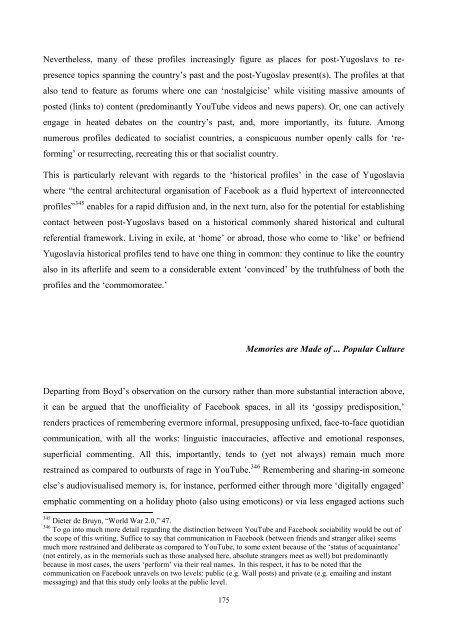UNIVERSITY OF NOVA GORICA GRADUATE SCHOOL ...
UNIVERSITY OF NOVA GORICA GRADUATE SCHOOL ...
UNIVERSITY OF NOVA GORICA GRADUATE SCHOOL ...
You also want an ePaper? Increase the reach of your titles
YUMPU automatically turns print PDFs into web optimized ePapers that Google loves.
Nevertheless, many of these profiles increasingly figure as places for post-Yugoslavs to represence<br />
topics spanning the country‘s past and the post-Yugoslav present(s). The profiles at that<br />
also tend to feature as forums where one can ‗nostalgicise‘ while visiting massive amounts of<br />
posted (links to) content (predominantly YouTube videos and news papers). Or, one can actively<br />
engage in heated debates on the country‘s past, and, more importantly, its future. Among<br />
numerous profiles dedicated to socialist countries, a conspicuous number openly calls for ‗reforming‘<br />
or resurrecting, recreating this or that socialist country.<br />
This is particularly relevant with regards to the ‗historical profiles‘ in the case of Yugoslavia<br />
where ―the central architectural organisation of Facebook as a fluid hypertext of interconnected<br />
profiles‖ 345 enables for a rapid diffusion and, in the next turn, also for the potential for establishing<br />
contact between post-Yugoslavs based on a historical commonly shared historical and cultural<br />
referential framework. Living in exile, at ‗home‘ or abroad, those who come to ‗like‘ or befriend<br />
Yugoslavia historical profiles tend to have one thing in common: they continue to like the country<br />
also in its afterlife and seem to a considerable extent ‗convinced‘ by the truthfulness of both the<br />
profiles and the ‗commomoratee.‘<br />
Memories are Made of ... Popular Culture<br />
Departing from Boyd‘s observation on the cursory rather than more substantial interaction above,<br />
it can be argued that the unofficiality of Facebook spaces, in all its ‗gossipy predisposition,‘<br />
renders practices of remembering evermore informal, presupposing unfixed, face-to-face quotidian<br />
communication, with all the works: linguistic inaccuracies, affective and emotional responses,<br />
superficial commenting. All this, importantly, tends to (yet not always) remain much more<br />
restrained as compared to outbursts of rage in YouTube. 346 Remembering and sharing-in someone<br />
else‘s audiovisualised memory is, for instance, performed either through more ‗digitally engaged‘<br />
emphatic commenting on a holiday photo (also using emoticons) or via less engaged actions such<br />
345 Dieter de Bruyn, ―World War 2.0,‖ 47.<br />
346 To go into much more detail regarding the distinction between YouTube and Facebook sociability would be out of<br />
the scope of this writing. Suffice to say that communication in Facebook (between friends and stranger alike) seems<br />
much more restrained and deliberate as compared to YouTube, to some extent because of the ‗status of acquaintance‘<br />
(not entirely, as in the memorials such as those analysed here, absolute strangers meet as well) but predominantly<br />
because in most cases, the users ‗perform‘ via their real names. In this respect, it has to be noted that the<br />
communication on Facebook unravels on two levels: public (e.g. Wall posts) and private (e.g. emailing and instant<br />
messaging) and that this study only looks at the public level.<br />
175

















